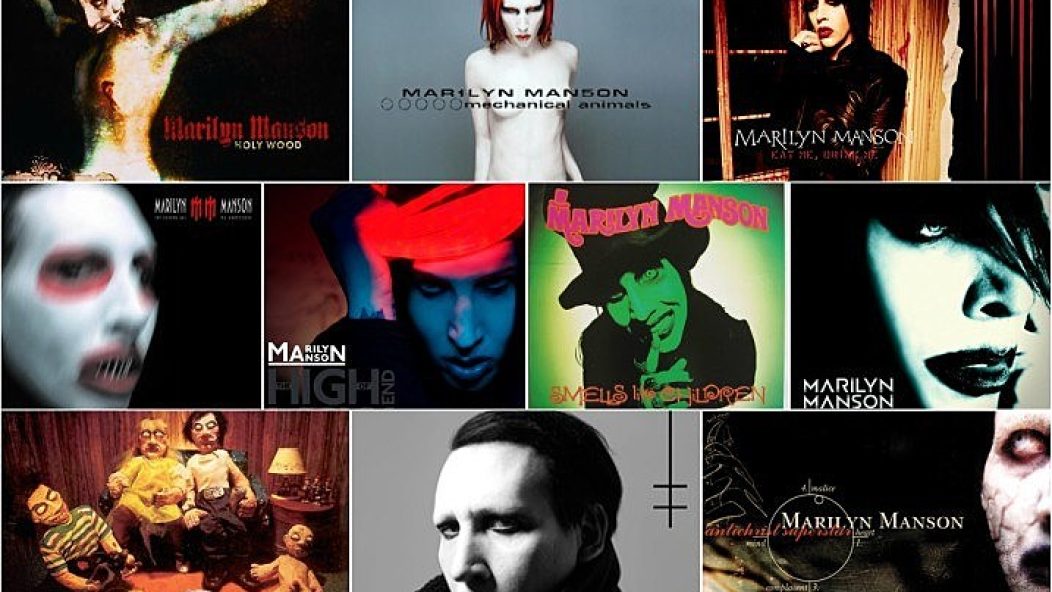
13 Marilyn Manson deep cuts that are genius and dark AF
Now that the 10th offering from the God of Fuck himself is amongst us, it’s about time we paid our respects to everything that came before it. Ten albums is a lot by anyone's standards, and that's not even including the EPs, demos and live albums.
Below are 13 tracks you may have missed, forgotten or just straight-up haven’t heard. Let us remind you of their sheer genius that's hidden away amongst those 10 albums.
“Everlasting C***sucker” (Smells Like Children, 1995)
It’s apt to start at the beginning-ish, so here’s a remix of Portrait Of An American Family cut “Cake & Sodomy” finding itself even more menacing—with the tribal drums paired with the lyrics that bore Manson’s beloved moniker. The urgency of the original might be missing, but the elongated approach draws into the idea that the American Dream is an endless nightmare Manson constantly feeds on.
“You’re So Vain” feat. Johnny Depp (Born Villain, 2009)
Of all the Manson covers, this might be the one that’s skipped your attention. Released as a bonus track, his approach is, as always, to find the darker, more cynical side to the song—which, admittedly, is there anyway, but with the Manson touch, it’s a whole new ball game.
“Snake Eyes and Sissies” (Portrait Of An American Family, 1994)
Where would the shock value be if you couldn't get into the mind of an apparent serial killer (not Manson)? Listen to how he delivers the psyche building blocks to paint a picture of a real psychopath who does what he needs to to serve his own needs.
“Vodevil” (The Golden Age Of Grotesque, 2003)
Leave it to Manson to create a song that perfectly encapsulates not only an aesthetic but also give it an autobiographical take—while referencing David Bowie, hard. The depth that can be found on this track is impeccable, but standout moments include the pre-chorus, which takes from Bowie's “Cracked Actor,” and the chorus that references the power and might of the Manson band as more than music or band members, but rather a hand ready to slap some sense into their audience.
“Mechanical Animals” (Mechanical Animals, 1998)
One of the more David Bowie-feeling tracks Manson recorded, it’s completely epic in all the right ways. Plus, creating a portmanteau of “phenobarbidoll” is just inspired. If ever you needed evidence that he’s a wordsmith of epic, gothic proportions, here it is.
“Unkillable Monster” (The High End Of Low, 2009)
This is one of those moments where Manson gets (dare we say it) vulnerable. It feels as if he’s talking about how far he’s come—further than he ever believed he could. Matching that with the rest of the record, “Unkillable Monster” both cements his acceptance of his own untouchable level and actual acknowledgment of the expected shock value he brings to the world.
“Evidence” (Eat Me, Drink Me, 2007)
That menacing, high-note riff that plays off the pounding drums, leading into a chorus of pure magical guitars is the essence of what makes Manson, Manson. Singing of a romantic tryst filled with raw passion, the kind that overtakes everything you’ve ever known, and replacing it with uncontrollable, almost horrific desire is what makes this an unrecognized Manson classic.
“President Dead” (Holy Wood (In The Shadow Of The Valley Of Death), 2000)
Always one for shock value, this track is about the assassination of President John F. Kennedy and is exactly three minutes and 13 seconds long–a significant length in that that's when you see Kennedy shot: at the 3:13 time mark in Abraham Zapruder's home video of the parade. It has only been played live once: in Dallas, Texas, where Kennedy was shot.
“Great Big White World” (Mechanical Animals, 1998)
“Great Big White World” is a scene setter that also operates as one hell of a metaphor for cocaine. A classic rock move, it’s beautiful, inspiring and just downright huge.
“Mutilation Is The Most Sincere Form Of Flattery” (Eat Me, Drink Me, 2007)
Purportedly about Manson taking issue with a certain beloved emo band borrowing aesthetic elements from him, “MITMSFOF” has a playful edge, but soon turns to a prowling, predatory chorus that just reiterates “fuck you, fuck you; fuck you, too.” Never one to mince his words, if this were to be aimed at anyone, you know the message is loud and clear.
“Mister Superstar” (Antichrist Superstar, 1996)
Here’s another look at the fandom that being a rockstar brings. The unwanted attention is good to an extent, but here, Manson uses the chorus to break the truth down into three simple lines: “I know I can turn you on/I wish that I could just turn you off/I never wanted this.” While it definitely comes under the rock-opera trio storyline (Antichrist Superstar, Mechanical Animals, Holy Wood), you can’t help but align the subject matter to Manson’s own life, giving it all the more power.
“15” (The High End Of Low, 2009)
For Manson, this is a fairly sparse and vulnerable cut. Recorded in one take, just after the stroke of midnight on his birthday no less (hence the lyrics “today is my birthday”). The atmosphere throughout the track is desolate, yearning and heart-bearing. Manson’s never claimed to be easily understood, but “15” gives you a chance to attempt to delve into his state of mind—especially around this release.
“Saturnalia” (Heaven Upside Down, 2017)
While the album's only been out a few days now, there are already some tracks that have that everlasting, deep cut appeal. Eight minutes in length, it’s another Manson-esque epic track that goes into storytelling, rife with industrial electronica and haunting vocals that do their best to creep up your spine and ingrain themselves in your head.








